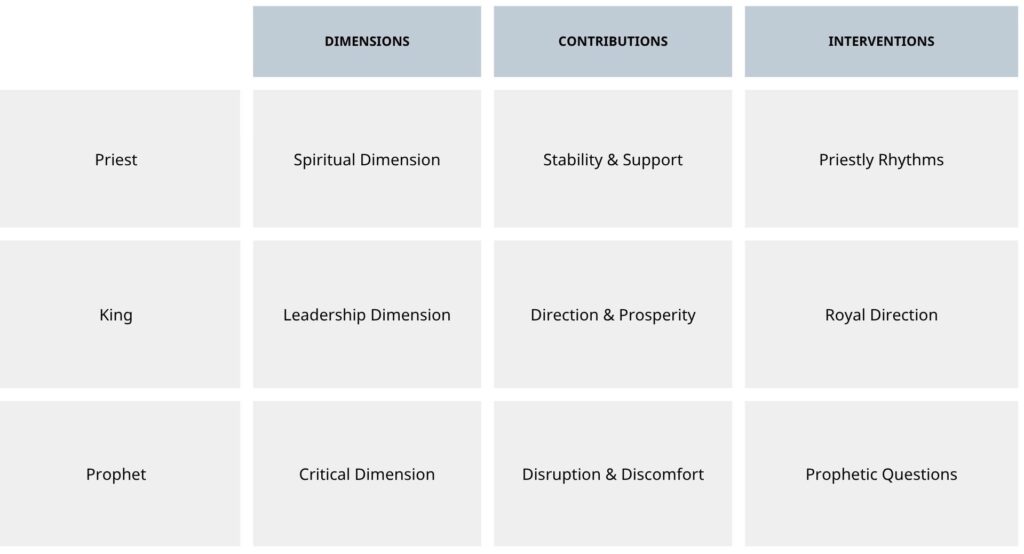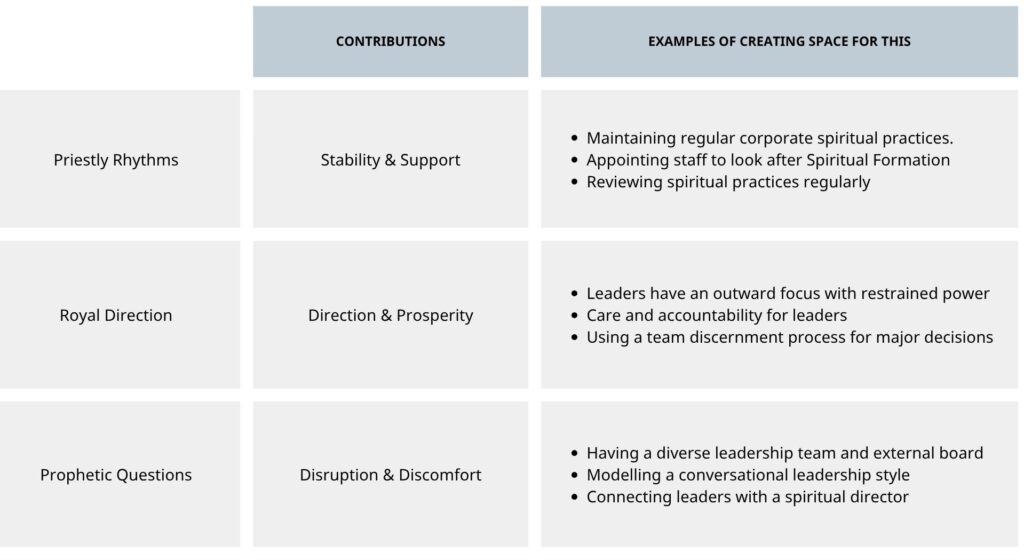‘Is all this planning and strategizing really biblical?!’ exclaimed Pastor Patrick, a senior church leader from Fiji. Recently, he had joined an international mission network and was struck by what came across to him as a corporate culture rather than a biblical one. His question made me think: What is actually a biblical way of running an organisation or project? Wouldn’t it be fascinating to study how God managed ‘project Israel’ and see what we can learn from that in the 21st century? As I started to read the Old Testament through a management lens, I realised that the foundation on which God wanted to work was laid by the three roles he created for the running of ‘Israel.org’: the Priest, the King, and the Prophet.1
The Three Roles
The priest connected mankind with God. The priest brought the spiritual rhythms and the structures to the people. Priests symbolized the spiritual dimension and brought stability and support. However, the Israelites did not think such a priest was enough: the other ‘organisations’ in those days all gradually acquired a ‘ruler’ and they wanted that too; someone who could lead them into battle, who could solve problems and bring progress—a king! The king symbolized the leadership dimension and brought direction and prosperity.
Priests symbolized the spiritual dimension and brought stability and support

But Samuel didn’t like the idea of a king at all (1 Samuel 8:6-22)! Samuel was afraid that a king would take the role of God, and history shows that the prophet was not far off. As soon as the king became part of the ‘organisation’, the priest, as an counterpart could not provide sufficient balance. A prophet was needed; a person who could speak on behalf of God: ‘Thus says the Lord of hosts . . .’ and, above all, could call the king to account. The prophet symbolized the critical dimension.
The king symbolized the leadership dimension and brought direction and prosperity
The prophets were often the ones who brought disruption and discomfort. Nathan with David, Elijah with Ahab, Jeremiah with Josiah, etc. They represented divine disruption, and that all too often turned out to be necessary. Israel as an organisation constantly needed three types of interventions: priestly rhythms, royal directions, and prophetic questions.
The prophet symbolized the critical dimension

How ‘Biblical’ is my Organisation?
In Christian organisations, the role of the ‘priest’ is usually well represented, at least on paper: the importance of priestly rhythms is often well grounded in our foundational documents, and devotional moments are part of our routines. However, in practice, we struggle to integrate the spiritual dimension into our corporate practices. In our meetings, the devotional times are usually separated from our business sessions. The ‘lifting up our hands in prayer’ is often scheduled after everything has already been decided, and the mobilisation of prayer is delegated to a prayer department. The ‘singing of praises’ through our external publications is more based on marketing rules than the Psalms. The ‘sacrifices’ we bring are like the offering of a few doves, rather than something really sacrificial. We tend to silo out the spiritual dimension to the personal lives of our staff rather than integrating it in our corporate functioning

Right from the start of the modern mission movement, the ‘king’ is prominently present in our networks and mission organisations. Just like Israel in the time of Samuel, we want royal directions. We put great effort into appointing good leaders, and leadership development programs are getting a lot of attention these days. The ‘king’ of the organisation is expected to be outward-looking, well-versed in modern management techniques, and there is a high expectation that numeric progress is made.2 What we often forget is that from the start, the Bible had a critical attitude towards this ‘king phenomenon’. Jesus himself turned the kingly role upside down by washing feet and allowing himself to be killed. Just like for Israel, there is a constant challenge for organisations, on the one hand, to plan well to ‘build towers’ (Luke 14:28) while at the same time ‘not trusting in our own understanding’ (Prov 3:5).
Colleagues who ask critical questions are often quickly dismissed as a nuisance or, even worse, as ‘unspiritual’.
The prophetic role is harder to deal with. We have often delegated that role to our boards. Our boards are encouraged to ask critical questions and hold us accountable. But is that indeed happening in a prophetic way, and is it sufficient? Colleagues who ask critical questions are often quickly dismissed as a nuisance or, even worse, as ‘unspiritual’. Even though we all have people in our organisations who seem too opinionated to work with, leaders should not dismiss their critical voices too quickly. We might accidentally ‘put a Jeremiah in prison’ and miss an important message from the Lord!

Can we Make our Organisations more ‘Biblical’?
With regards to priestly rhythms, we can learn from our Roman Catholic brothers and sisters. They are used to daily, weekly, and yearly practices that can help to pause and corporately connect with God.3 Many organisations already have a chaplain-type of person on their staff to help facilitate such rhythms. More recently, several mission organisations have started a department for Spiritual Formation and are experimenting with a variety of ways for incorporating spiritual practices into the rhythms of the organisations: corporate prayer, corporate scripture reading, corporate times of reflection, etc. Regularly reviewing our spiritual practices can help to keep them fresh and meaningful. Priestly rhythms shape our organisational identity and keep our organisations focused on the Lord.4
We noted above that royal direction setting usually gets significant attention. But just like we see with the kings in the Old Testament, too many evangelical leaders do not finish well. Since Dr Robert Clinton5 started to bring attention to this fact at the end of the last century, many organisations have been requiring more care and accountability for their ‘kings’. Still, we see that the pressures leaders face and the powers they wield make far too many fail. It is good to note that increasingly, leaders are committing themselves to spiritual practices. Also, concepts like ‘Servant Leadership’, the ‘Fivefold Ministry’, and courses like ‘Leading like Jesus’ are good efforts to make our ‘kings’ more Christlike than worldly.6 The recent trend in mission organisations to appoint a team rather than a person as the leader can also help against authoritarian tendencies.
With regards to direction setting, good Bible-based tools have been developed. For example, Ruth Haley Barton has written extensively about guided discernment processes that facilitate decision-making in a far more prayerful way than the usual sandwich model of prayer-business-prayer.7 In the leadership team of which I am a part, we regularly use such processes for major decisions. Overall, we can say that we should be hesitant in giving our ‘kings’ too much power while still providing space for royal direction setting.
Welcoming prophetic questions starts with the creation of a diverse leadership team of people from different backgrounds. Having an external board of spiritually strong individuals from different walks of life can also prevent us from growing inward and help us remain open to outside voices.8 For day-to-day decision-making, a conversational leadership 9 style that provides a safe space for diverse perspectives creates an open culture where ‘prophets’ can speak truth in love (Eph 4:15).
May we deliberately work with priestly rhythms, seek royal direction, and welcome prophetic questions
On a more personal level, I have seen leaders connecting with a spiritual director outside of their organisation who can act like a Nathan to King David—someone who can ask the hard questions and speak into issues from a spiritual perspective. The welcoming of prophetic questions can be disruptive, but that may well be what is needed for our organisations!

Disruption
Brother Patrick, whom I mentioned at the introduction, was one of several ‘prophets’ from Asia and the Pacific who, over the last few years, have ‘disrupted’ my value for systematically planned meetings and processes. They have helped me look more critically at my principles and practices for how I run meetings, teams, and networks. May we deliberately work with priestly rhythms, seek royal direction, and welcome prophetic questions to better reflect how God ran ‘Israel.org’ and apply that to our own organisations!
Endnotes
- The idea to look at the priest, king and prophet from a leadership perspective has been written about by R.B. Kuiper (1967), M.E. Stevens (2012) and many others. In this article, I use a similar typology, but apply it to organisations
- See also: The Projectisation of Mission, Lausanne 2022.
- The concept of Rule of Life is centuries old. See, for example, the Rule of Saint Augustine.
- See also: Organisational Spirituality by Paul Bendon-Samuel, which is a chapter in Spirituality in Mission: Embracing the Lifelong Journey. (Littleton: William Carey Publishing, 2018).
- See Three Articles about Finishing Well by Robert Clinton (1999)
- 6.The Fivefold Ministry refers to the 5 roles mentioned Ephesians 4:1-16. Alan Hisrch writes about it in his book 5Q: Reactivating the Original Intelligence and Capacity of the Body of Christ (100 Movements, 2017). To learn about Leading Like Jesus the Lead Like Jesus website will be a good resource.
- A helpful resource about discernment is the book from Ruth Haley Barton: Pursuing God’s Will Together: A Discernment Practice for Leadership Groups. (Lisle, IL: IVP, 2012).
- Research from the corporate world shows that more diversity in the leadership team and board of directors leads to better performance (E.g. Why Diversity Matters Even More, McKinsey, 2023). From a Biblical perspective we see from Ephesians 4:11-12 that churches were led by people with a diverse set of gifts.
- A practical way to explore conversational leadership is by listening to the Leading in Conversation podcast produced by Kate King and Nelis van de Berg, two leaders in a Christian organisation.
